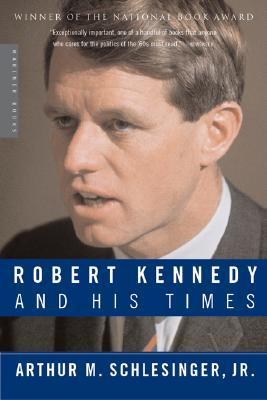What do you think?
Rate this book


1088 pages, Paperback
First published January 1, 1978
"Robert Kennedy began as a true believer. He acquired his perceptions of the complexity of things partly because his beloved older brother led him to broader views of society and life and partly becasue his beloved older brother led him to broader views of society and life and partly because he himself possessed to an exceptional degree an experiencing nature. John Kennedy was a realist brilliantly disquised as a romantic; Robert Kennedy, a romantic stubbornly disguised as a realist."
"He was now the head of the family. With his father stricken, his older brothers dead, he was accountable to himself. The qualities he had so long subordinated in the interest of others--the concern under the combativeness, the gentleness under the carapace, the idealism, at once wistful and passionate, under the toughness--could rise freely to the surface. He could be himself at last."
When he shall die
Take him and cut him out in little stars
And he will make the face of heaven so fine
That all the world will be in love with night,
And pay no worship to the garish sun.
"Kennedy had no intention of dispatching American ground forces to save South Vietnam. Nor did he accept the Truman-Eisenhower-Pentagon view that a President had inherent authority to send an expeditionary force into battle. If combat troops 'in the generally understood sense of the word'--units, not advisers--were required in Vietnam, he told a press conference in March 1962, that would be 'a basic change. . . which calls for a constitutional decision, [and] of course I would go to the Congress."
"In July 1962. . . . Kennedy instructed McNamara to start planning for the phased withdrawal of American military personnel from Vietnam. The assumption was that South Vietnamese troops would take up the slack as their capabilities improved under American training. The target date for complete disengagement was the end of 1965. After several tries, the military produced an acceptable plan in May 1963."
"At the start Lyndon Johnson gave mighty impetus to the twin stars against poverty asnd racial inequality. So long as the Great Society absorbed the President, there was strong reason for Kennedy, despite differences on foreign policy, not to break with the administration."
"Robert Kennedy saw Vietnam, not in abstractions but in images--a village smashed, children scorched, the mother clasping the baby while fire rained inexplicably from the sky. This compulsion to be at one with individuals in extreme situations was increasingly the key to his politics."
"My favorite poet was Aeschylus. He wrote: 'In our sleep, pain which cannot forget falls drop by drop upon the heart until, in our own depair, against our will, comes wisdom through the awful grace of God.'"